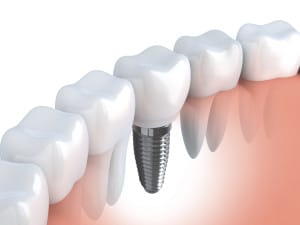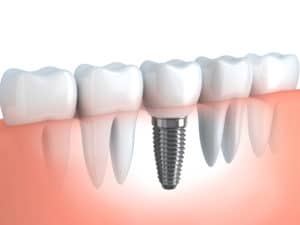Did you know that over 178 million Americans are missing at least one tooth? People can lose their teeth for many reasons, whether it’s due to gum disease, excessive decay, or something like a sports accident. But if you don’t replace a missing tooth or teeth, you can develop far more problems than a gap in your smile. This is where dental implants come in.
At Gentle Dental Care, serving Edison, Metuchen & South Plainfield, New Jersey, we offer a variety of restorative dental services, including individual implants and All-On-X implants. These options allow us to replace one tooth, several teeth, or an entire row to restore your smile.
What Are Dental Implants?
Dental implants are artificial tooth roots made of titanium that are placed into the jawbone to support a replacement tooth or bridge. They’re a long-lasting option for people who have lost a tooth due to decay, gum disease, or injury.
Once healed, the implant functions much like a natural tooth, allowing you to chew, speak, and smile with confidence.
All-On-X Dental Implants
In addition to singular implants, Gentle Dental Care also offers All-On-X dental implants, a full-arch replacement option for patients missing most or all of their teeth.
All-On-X refers to using four, five, or six implants placed at precise angles to support a full arch of prosthetic teeth. This approach makes efficient use of available bone and often avoids the need for bone grafting. The prosthetic teeth are permanently attached, so there’s no shifting, no adhesives, and no removal needed.
Why Do I Need to Replace a Missing Tooth With a Tooth Implant?
Missing teeth can cause quite a few problems if they aren’t replaced, including:
- Shifting of nearby teeth: This can lead to bite issues and misalignment.
- Jawbone loss: When the bone no longer receives pressure from chewing, it may start to break down.
- Changes in facial appearance over time: You may notice your lower face begins to look sunken.
- Difficulty chewing: This is especially common if you're missing any molars.
- Speech issues: You might make a whistling noise when you speak or slur your words.
- Less confidence: Some people don't feel comfortable smiling with missing teeth.

Dental Implant Benefits

Here are some of the key advantages of choosing a dental implant:
- Restores bite strength so you can eat comfortably.
- Replaces teeth too damaged for fillings or crowns.
- Prevents the shifting of nearby teeth.
- Makes oral hygiene easier by keeping teeth aligned.
- Helps maintain jawbone health by stimulating bone tissue.
The Difference Between Dental Implants and Traditional Bridges
Dental implants offer a conservative solution compared to a traditional bridge. Only the tooth that is being replaced is affected. The teeth on either side of the missing tooth are not ground down and capped.
Patients can opt to have one or several teeth replaced with dental implants. Dental implants can also support dentures, which tend to be more stable and comfortable than those held in place with adhesive.
How Is a Dental Implant Procedure Performed?
At Gentle Dental, we begin the tooth implant process with your consultation. This includes a full oral exam, X-rays, and a CT scan. From this information, we can decide if your jawbone mass and density are right for dental implants. We use this information to also decide on the size and shape of the implant.
From there, the implant process involves four steps:
- Placement: A titanium post is surgically inserted into the jawbone where the tooth root used to be.
- Osseointegration: Over the next three to six months, the implant fuses with the jawbone to form a solid anchor. This process is called osseointegration.
- Abutment: Once the implant is stable, we attach a small connector post.
- Crown: A custom-made porcelain crown is placed on top to complete your smile.
What Our Patients Have To Say
“I feel it is a very pleasant experience coming to the office. I do not feel a thing when I have work done. Everyone is friendly and happy, especially Maggie. I am looking forward to getting my mouth into the best shape possible!” – Erika L. 10-29-05
The All-On-X Implant Procedure
All-On-X is a full-arch tooth replacement method that uses four or more implants to support a fixed set of teeth. Here's how the All-On-X process works:
- Comprehensive Planning: Just like with individual implants, we begin with a detailed evaluation, including imaging and digital scans to map out implant placement.
- Implant Placement: Four to six implants are strategically placed in the jaw to take advantage of the strongest areas of bone. These may be angled for optimal support, especially in patients with bone loss.
- Temporary Teeth: In many cases, we attach a temporary full set of teeth on the same day, so you still have a functional smile while your implants heal over the next three to six months.
- Final Prosthesis: After the healing period, we secure a custom, permanent full-arch prosthetic to the implants for long-term use.
How Long Do Dental Implants Last?
Dental implants have a long track record of success, with studies showing 90–95% of them remain functional for the long term. With regular dental visits and good oral hygiene, many people keep their implants for life.
All-On-X implants use the same durable titanium posts and offer similar longevity. While the implants themselves can last a lifetime, the full-arch restoration attached to them may need replacement or maintenance over time due to normal wear.
How Much Do Dental Implants Cost?
Dental implants generally have a higher up-front cost than traditional crowns and bridges. The restoration process also takes much longer.
That being said, the investment in time and money can more than pay for itself with a reduction in dental interventions over your lifetime. You’ll just want to practice good dental hygiene to avoid losing more teeth.

For an estimate of how much your dental implants may cost, contact Gentle Dental Care today.
Why Choose Gentle Dental Care?
At Gentle Dental Care, each doctor brings something unique to the table. Dr. Brad Strober combines a strong academic background with a real commitment to staying current in the field. Dr. Cynthia Butcofski has been caring for patients in Edison for over 15 years and is known for her steady approach. Dr. Rebecca Kucharsky Hiess adds a detail-focused perspective, with training in gum health and full-mouth care.
What really makes our practice stand out is how our providers connect with people. We make sure you always know what to expect and never feel rushed. They’re the kind of dentists who remember your name, follow up after your visit, and genuinely care about helping you feel at ease.
Dental Implants FAQs
What Are the Benefits of All-On-X Implants?
All-On-X implants offer a reliable, full-arch solution that combines stability, function, and aesthetics. Patients who choose this method often experience several long-term advantages, including:
- Fewer implants needed for full-arch restoration
- Strong, stable bite and natural feel
- No need for adhesives or removal
- Can help preserve jawbone density
- Often allows for same-day temporary teeth
Why Should I Have a Tooth Implant Versus a Bridge?
Once placed, a dental implant behaves just like a normal tooth, enabling the person to eat whatever they want again. This isn’t possible with a bridge, which requires the person to avoid certain foods that can damage the bridge.
Also, when placing a bridge, the teeth on both sides of the gap need to be crowned to anchor the bridge. In preparation, those healthy teeth need to be ground down to accommodate the crowns. Dental implants do not affect the adjacent teeth at all. Implants also have a much longer lifespan than any bridge.
How Long Does the All-On-X Dental Implant Procedure Take?
The surgical placement of All-On-X implants typically takes about two to four hours per arch. In many cases, temporary teeth are attached the same day.
After the implants heal and fully integrate with the jawbone over the next three to six months, we place the final custom prosthetic. That final visit typically takes about an hour and completes the process.
Who Is a Good Candidate for Dental Implants?
Dental implants can be a reliable option for many people, but certain factors need to be in place for the treatment to succeed. Someone may be a good candidate if they:
- Have permanent teeth and are either an adult or an older child
- Are in good general health, regardless of age
- Have enough jawbone to support the implant
- Do not have untreated advanced gum disease
- Are able to undergo bone grafting if bone loss has occurred
- Do not smoke or are willing to quit before surgery
- Have not experienced significant jawbone shrinkage without correction
- Have no active infections or untreated dental issues
Can I Replace My Dentures With All-On-X Implants?
Yes, this may be an option for you. All-On-X implants offer a fixed alternative to traditional dentures by using four or more implants to support a full arch of teeth. They provide better stability, improved chewing power, and a more natural feel without the need for adhesives.
Your dentist will evaluate your bone structure to see if you're a good candidate or if bone grafting is needed first.
Can I Use Dental Implants to Anchor Dentures?
People missing many teeth may not want to have all their teeth replaced with dental implants. In these cases, implants are still effective as anchors for partial or even full dentures.
Strategically placed implants give dentures much more stability, so you can eat different foods more comfortably.
Do Dental Implants Require Special Care?
Caring for a tooth implant is no different than caring for your natural teeth. Daily brushing and flossing are all that’s required.
What Is Recovery Like After Getting Dental Implants?
For most patients, recovery after a single implant is straightforward. There will be mild swelling, tenderness, and minor bleeding in the first 24–48 hours. You should be able to manage discomfort with over-the-counter pain relievers.
Most people can return to their normal routines within a day or two, though the implant still needs several months to fully fuse with the jawbone (osseointegration) before the final crown is placed.
Although All-On-X is more involved, most of the pain and swelling will peak within the first two to three days and get much better by the end of the first week. We recommend eating soft foods for the first couple of weeks, and we usually place temporary teeth on the same day so you can speak and smile.
Schedule a Consultation Today!
If you have any questions about getting dental implants, please feel free to give us a call at 732.549.5660 or schedule a consultation appointment.
We hope to be your practice of choice when looking for dental implants in Edison, Piscataway Township, New Brunswick, Metuchen, or Woodbridge Township, NJ!



